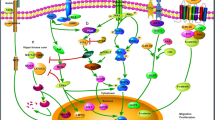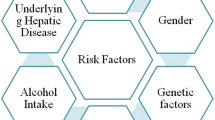Abstract
Hepatocellular carcinoma (HCC) is the sixth most prevalent cancer and the third most frequent cause of cancer-related death in developing countries, especially in East Asia and South Africa, and the identification of new biomarkers for early diagnosis and prognosis is needed. Delta-like 1 homologue (Drosophila) (DLK1) is expressed in malignancies and promotes cancer cell stemness and tumourigenicity, which makes this molecule a potential target for therapies directed against cancer stem/progenitor cells. Here, we aimed to assess the predictive value of DLK1 as a diagnostic and prognostic biomarker in HCC. With this purpose, serum DLK1 levels were detected using an enzyme-linked immunosorbent assay (ELISA) in serum specimens from 397 HCC patients, 114 healthy individuals, 43 patients with chronic hepatitis B virus (HBV) infection and 24 cirrhotic liver patients with HBV infection, and the correlation between DLK1 levels and clinical features was evaluated. Our data showed that the serum DLK1 level was significantly higher in HCC patients than in healthy individuals or patients with chronic HBV infection (HBV carriers) (P < 0.05). Moreover, the serum DLK1 levels were positively correlated with tumour size and α-fetoprotein (AFP) levels, but not with gender, age, histological grade, HBV infection, intrahepatic metastasis or cirrhosis in HCC patients. Kaplan–Meier analysis indicated that higher DLK1 levels were associated with shorter survival in HCC patients. These results suggest that the serum levels of DLK1 may serve as a prognostic biomarker for HCC patients.



Similar content being viewed by others
References
Forner A, Llovet JM, Bruix J. Hepatocellular carcinoma. Lancet. 2012;379(9822):1245–55.
Mossad NA, Mahmoud EH, Osman EA, Mahmoud SH, Shousha HI. Evaluation of squamous cell carcinoma antigen-immunoglobulin M complex (SCCA-IGM) and alpha-L-fucosidase (AFU) as novel diagnostic biomarkers for hepatocellular carcinoma. Tumor Biol. 2014;35(11):11559–64.
Yang JD, Roberts LR. Hepatocellular carcinoma: a global view. Nat Rev Gastroenterol Hepatol. 2010;7(8):448–58.
Venook AP, Papandreou C, Furuse J, de Guevara LL. The incidence and epidemiology of hepatocellular carcinoma: a global and regional perspective. Oncologist. 2010;15 Suppl 4:5–13.
Forner A, Bruix J. Biomarkers for early diagnosis of hepatocellular carcinoma. Lancet Oncol. 2012;13(8):750–1.
Larsen JB, Jensen CH, Schroder HD, Teisner B, Bjerre P, Hagen C. Fetal antigen 1 and growth hormone in pituitary somatotroph cells. Lancet. 1996;347(8995):191.
Jensen CH, Meyer M, Schroder HD, Kliem A, Zimmer J, Teisner B. Neurons in the monoaminergic nuclei of the rat and human central nervous system express FA1/dlk. Neuroreport. 2001;12(18):3959–63.
Bauer M, Szulc J, Meyer M, Jensen CH, Terki TA, Meixner A, et al. Delta-like 1 participates in the specification of ventral midbrain progenitor derived dopaminergic neurons. J Neurochem. 2008;104(4):1101–15.
Abdallah BM, Jensen CH, Gutierrez G, Leslie RG, Jensen TG, Kassem M. Regulation of human skeletal stem cells differentiation by Dlk1/Pref-1. J Bone Miner Res. 2004;19(5):841–52.
Raghunandan R, Ruiz-Hidalgo M, Jia Y, Ettinger R, Rudikoff E, Riggins P, et al. Dlk1 influences differentiation and function of B lymphocytes. Stem Cells Dev. 2008;17(3):495–507.
Li L, Forman SJ, Bhatia R. Expression of DLK1 in hematopoietic cells results in inhibition of differentiation and proliferation. Oncogene. 2005;24(27):4472–6.
Smas CM, Sul HS. Pref-1, a protein containing EGF-like repeats, inhibits adipocyte differentiation. Cell. 1993;73(4):725–34.
Floridon C, Jensen CH, Thorsen P, Nielsen O, Sunde L, Westergaard JG, et al. Does fetal antigen 1 (FA1) identify cells with regenerative, endocrine and neuroendocrine potentials? A study of FA1 in embryonic, fetal, and placental tissue and in maternal circulation. Differentiation. 2000;66(1):49–59.
Abdallah BM, Boissy P, Tan Q, Dahlgaard J, Traustadottir GA, Kupisiewicz K, et al. dlk1/FA1 regulates the function of human bone marrow mesenchymal stem cells by modulating gene expression of pro-inflammatory cytokines and immune response-related factors. J Biol Chem. 2007;282(10):7339–51.
Smas CM, Kachinskas D, Liu CM, Xie X, Dircks LK, Sul HS. Transcriptional control of the pref-1 gene in 3T3-L1 adipocyte differentiation. Sequence requirement for differentiation-dependent suppression. J Biol Chem. 1998;273(48):31751–8.
Surmacz B, Noisa P, Risner-Janiczek JR, Hui K, Ungless M, Cui W, et al. DLK1 promotes neurogenesis of human and mouse pluripotent stem cell-derived neural progenitors via modulating Notch and BMP signalling. Stem Cell Rev. 2011;8(2):459–71.
Ferron SR, Charalambous M, Radford E, McEwen K, Wildner H, Hind E, et al. Postnatal loss of Dlk1 imprinting in stem cells and niche astrocytes regulates neurogenesis. Nature. 2011;475(7356):381–5.
Liu L, Luo GZ, Yang W, Zhao X, Zheng Q, Lv Z, et al. Activation of the imprinted Dlk1-Dio3 region correlates with pluripotency levels of mouse stem cells. J Biol Chem. 2010;285(25):19483–90.
Ceder JA, Jansson L, Helczynski L, Abrahamsson PA. Delta-like 1 (Dlk-1), a novel marker of prostate basal and candidate epithelial stem cells, is downregulated by notch signalling in intermediate/transit amplifying cells of the human prostate. Eur Urol. 2008;54(6):1344–53.
Mirshekar-Syahkal B, Haak E, Kimber GM, van Leusden K, Harvey K, O’Rourke J, et al. Dlk1 is a negative regulator of emerging hematopoietic stem and progenitor cells. Haematologica. 2012;98(2):163–71.
Yanai H, Nakamura K, Hijioka S, Kamei A, Ikari T, Ishikawa Y, et al. Dlk-1, a cell surface antigen on foetal hepatic stem/progenitor cells, is expressed in hepatocellular, colon, pancreas and breast carcinomas at a high frequency. J Biochem. 2010;148(1):85–92.
Harkness L, Taipaleenmaki H, Mahmood A, Frandsen U, Saamanen AM, Kassem M, et al. Isolation and differentiation of chondrocytic cells derived from human embryonic stem cells using dlk1/FA1 as a novel surface marker. Stem Cell Rev. 2009;5(4):353–68.
Battulin NR, Khabarova AA, Boyarskikh UA, Menzorov AG, Filipenko ML, Serov OL. Reprogramming somatic cells by fusion with embryonic stem cells does not cause silencing of the Dlk1-Dio3 region in mice. World J Stem Cells. 2012;4(8):87–93.
Whalley K. Stem cells: a niche role for DLK1. Nat Rev Neurosci. 2011;12(9):489.
Yu F, Hao X, Zhao H, Ge C, Yao M, Yang S, et al. Delta-like 1 contributes to cell growth by increasing the interferon-inducible protein 16 expression in hepatocellular carcinoma. Liver Int. 2010;30(5):703–14.
Kim Y, Lin Q, Zelterman D, Yun Z. Hypoxia-regulated delta-like 1 homologue enhances cancer cell stemness and tumorigenicity. Cancer Res. 2009;69(24):9271–80.
Huang J, Zhang X, Zhang M, Zhu JD, Zhang YL, Lin Y, et al. Up-regulation of DLK1 as an imprinted gene could contribute to human hepatocellular carcinoma. Carcinogenesis. 2007;28(5):1094–103.
Jin ZH, Yang RJ, Dong B, Xing BC. Progenitor gene DLK1 might be an independent prognostic factor of liver cancer. Expert Opin Biol Ther. 2008;8(4):371–7.
Jensen CH, Krogh TN, Hojrup P, Clausen PP, Skjodt K, Larsson LI, et al. Protein structure of fetal antigen 1 (FA1). A novel circulating human epidermal-growth-factor-like protein expressed in neuroendocrine tumors and its relation to the gene products of dlk and pG2. Eur J Biochem. 1994;225(1):83–92.
Yin D, Xie D, De Vos S, Liu G, Miller CW, Black KL, et al. Imprinting status of DLK1 gene in brain tumors and lymphomas. Int J Oncol. 2004;24(4):1011–5.
Zhang W, Shao Z, Fu R, Wang H, Li L, Yue L. Effect of DLK1 on tumorigenesis in CD34CD38 bone marrow cells in myelodysplastic syndromes. Oncol Lett. 2013;6(1):203–6.
Xu X, Liu RF, Zhang X, Huang LY, Chen F, Fei QL, et al. DLK1 as a potential target against cancer stem/progenitor cells of hepatocellular carcinoma. Mol Cancer Ther. 2012;11(3):629–38.
Nueda ML, Naranjo AI, Baladron V, Laborda J. The proteins DLK1 and DLK2 modulate NOTCH1-dependent proliferation and oncogenic potential of human SK-MEL-2 melanoma cells. Biochim Biophys Acta. 2014;1843(11):2674–84.
Falix FA, Aronson DC, Lamers WH, Hiralall JK, Seppen J. DLK1, a serum marker for hepatoblastoma in young infants. Pediatr Blood Cancer. 2012;59(4):743–5.
Dezso K, Halasz J, Bisgaard HC, Paku S, Turanyi E, Schaff Z, et al. Delta-like protein (DLK) is a novel immunohistochemical marker for human hepatoblastomas. Virchows Arch. 2008;452(4):443–8.
Acknowledgments
This work was supported in part by grants from the National Key Program for Basic Research of China (973) (2015CB553905), National Natural Science Foundation of China (81272438, 81201623, 81372192 and 81472726), Key Discipline and Specialty Foundation of Shanghai Municipal Commission of Health and Family Planning, Innovation Program of Shanghai Municipal Education Commission (No. 13ZZ082), National Key Sci-Tech Special Project of China (2013ZX10002-011) and SKLORG Research foundation (91-12-04, 91-13-02 and 91-14-09).
Conflicts of interest
None
Author information
Authors and Affiliations
Corresponding author
Rights and permissions
About this article
Cite this article
Li, H., Cui, Ml., Chen, Ty. et al. Serum DLK1 is a potential prognostic biomarker in patients with hepatocellular carcinoma. Tumor Biol. 36, 8399–8404 (2015). https://doi.org/10.1007/s13277-015-3607-8
Received:
Accepted:
Published:
Issue Date:
DOI: https://doi.org/10.1007/s13277-015-3607-8




